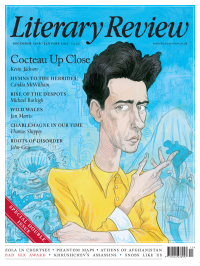Justin Beplate
Endgame
The Letters of Samuel Beckett: Volume IV, 1966-1989
By George Craig, Martha Dow Fehensenfield, Dan Gunn & Lois More Overbeck (edd)
Cambridge University Press 837pp £29.99
The years covered by this fourth and final volume of Samuel Beckett’s letters were creatively productive ones for him, even if his best-known works – plays such as Waiting for Godot, Endgame and Krapp’s Last Tape or the novels Molloy, Malone Dies and The Unnamable – were behind him. In the mid-1970s Beckett disavowed any further theatre work, complaining that it left him unable to think of anything else. ‘The result is quite out of proportion with the efforts I make,’ he writes to his close friend Jocelyn Herbert, ‘so unfitted am I to direct actors.’ But the resolution was short-lived. Theatre work continued to preoccupy him, as both director and playwright, throughout the 1970s, leading to some of his most formally innovative plays – Not I, That Time and Footfalls, among others – and the production of several television plays. It was also a period in which some of his most lyrically evocative prose was written, including the remarkable Company, rich in autobiographical detail from Beckett’s own childhood, and the spectrally strange Ill Seen Ill Said, a deeply moving distillation of loss and bereavement conveyed through flickering images of an ‘old so dying woman’ straying across the encroaching whiteness of a wintry landscape.
For a writer who had staked his career on the creative possibilities of impotence and failure, old age is not without its consolations. Birthdays are ‘sad occasions’, he writes, in response to a friend’s best wishes for his seventy-fourth birthday, adding, ‘I work on, with failing mind, in

Sign Up to our newsletter
Receive free articles, highlights from the archive, news, details of prizes, and much more.@Lit_Review
Follow Literary Review on Twitter
Twitter Feed
Like many trains in this country, HS2 has been blighted by delays and rocketing costs.
David Leeder asks who is to blame for the project's failures.
David Leeder - One-Track Minds
David Leeder: One-Track Minds - Off the Rails: The Inside Story of HS2 by Sally Gimson
literaryreview.co.uk
In this month's @Lit_Review, I reviewed Nicola Barker's latest, TonyInterruptor, a weird/brilliant/singular novel in which an earnest heckle at a improvisational jazz concert goes viral.
Cosmo Adair - Malign Intervention
Cosmo Adair: Malign Intervention - TonyInterruptor by Nicola Barker
literaryreview.co.uk
I wrote about the history of fonts, and who gets to say they designed a typeface, for @Lit_Review